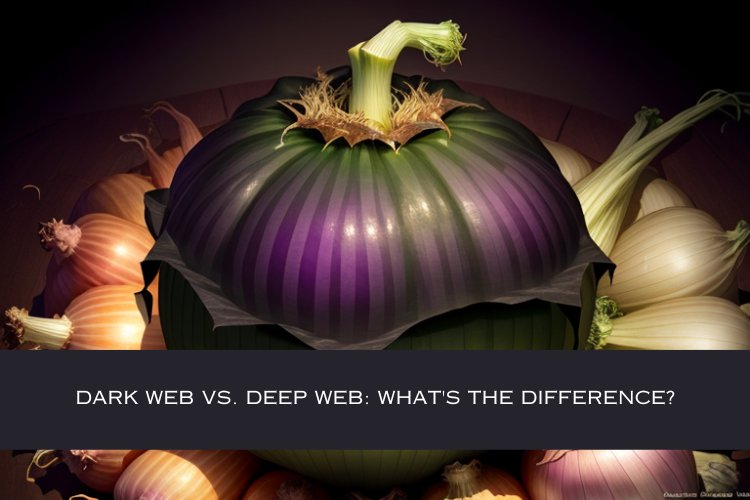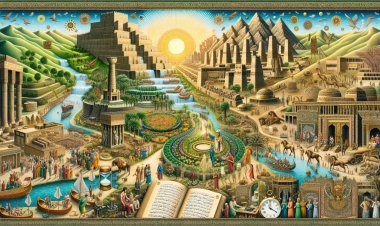Dark Web vs. Deep Web: What's the Difference?
In this article, we will delve into the differences between the dark web and the deep web, exploring their definitions, characteristics, and the implications they have on privacy, anonymity, and cybercrime.

Dark Web vs. Deep Web: What's the Difference?
1. Introduction to the Dark Web and Deep Web
The internet is a vast and complex network that houses not only the websites and content accessible through search engines like Google but also a hidden realm known as the deep web and its more notorious counterpart, the dark web. While the terms "deep web" and "dark web" are often used interchangeably, they refer to distinct and separate entities. We will examine the definitions, traits, and effects that the dark and deep webs have on privacy, anonymity, and cybercrime in this article as we examine their dissimilarities. By understanding these hidden layers of the internet, we can gain insight into the complexities of online information and the measures required for safe exploration.
1.1 What is the Dark Web?
When you think of the internet, you probably imagine the vast expanse of websites you can access with a quick search on Google. But lurking beneath the shiny surface of the World Wide Web is a hidden realm known as the Dark Web. The Dark Web is a part of the internet that is intentionally kept hidden and requires specific software to access. It is notorious for being a hub of illegal activities, offering everything from drugs and weapons to stolen data and hacking services.
1.2 Understanding the Deep Web
While the dark web often grabs headlines, it's important to differentiate it from the deep web. The Deep Web refers to all the parts of the internet that aren't indexed by search engines like Google. It includes things like private databases, academic resources, and password-protected websites. In other words, the Deep Web is like the unseen depths of the internet, inaccessible to the average user. While some parts of the Deep Web may be illicit, not all of it is a hotbed for criminal activity like the Dark Web.
2. Understanding the Dark Web: Definition and Characteristics
2.1 The Origins of the Dark Web
The Dark Web emerged as a result of a project by the US government called Tor (The Onion Router). Initially developed to protect online communications and enable anonymous browsing for activists and journalists, Tor inadvertently became a haven for illegal activities due to its encrypted and anonymous nature. Today, the Dark Web is a complex network of websites that can only be accessed using Tor or similar anonymizing software.
2.2 How Does the Dark Web Work?
The Dark Web operates through a network of servers that bounce your internet connection through multiple layers of encryption, making it difficult to trace your online activities. Websites on the Dark Web often have addresses ending in “. onion" instead of the usual ".com" or ".net." This unique domain structure allows users to browse anonymously and access websites that would otherwise be unreachable.
3. Exploring the Deep Web: What Lies Beneath the Surface
3.1 Unindexed Content on the Deep Web
The Deep Web is like a hidden treasure chest filled with valuable information. It includes things like private company intranet sites, medical records, court documents, and subscription-based academic journals. Since search engines do not index these areas of the internet, you won't find them while browsing the mainstream web. While the Deep Web has its fair share of legitimate content, it also hosts password-protected forums, private social networks, and other hidden services.
3.2 Accessing the Deep Web
Accessing the Deep Web is not as mysterious as it sounds. In fact, you probably interact with it more often than you realize. If you've ever logged into your online banking account, accessed your work emails, or used a password-protected forum, you've entered the Deep Web. Simply put, any part of the internet that requires authentication or special permissions falls under the umbrella of the Deep Web.
4. Key Differences between the Dark Web and the Deep Web
4.1 Definition and Scope
The Dark Web refers specifically to the encrypted network of websites that can only be accessed through specialized software. It is a small subset of the larger Deep Web, which encompasses all unindexed parts of the internet.
4.2 Content and Purpose
While the Dark Web is notorious for illegal activities and black market trade, the Deep Web encompasses a wide range of content, both legal and illicit. The Deep Web includes things like private databases, sensitive documents, and restricted content, in addition to the hidden services found on the Dark Web.
4.3 Accessibility and Anonymity
Accessing the Dark Web requires the use of specific software like Tor, which provides users with anonymity and encrypts their online activities. On the other hand, the Deep Web can be accessed by anyone with the necessary permissions or credentials, making it more accessible to the average user. So, before you go down the rabbit hole of the internet, it's important to understand the distinctions between the Dark Web and the Deep Web. While both may sound mysterious and intriguing, one is a shady underworld filled with illegal activities, while the other is simply the unseen depths of the internet.
5. Dark Web vs. Deep Web: Privacy and Anonymity
5.1 Privacy on the Dark Web
When it comes to privacy, the Dark Web takes it to a whole new level. You can think of it as the VIP section of the internet, where only those with an invitation get access. Websites on the Dark Web are encrypted and hidden from search engines, making it difficult for anyone to track your online activities. This heightened level of privacy is attractive to individuals who value their anonymity and want to keep their digital footprint under wraps.
5.2 Anonymity on the Deep Web
While the Deep Web doesn't offer the same level of anonymity as the Dark Web, it still provides a certain degree of privacy. The Deep Web refers to all the unindexed websites and content that search engines can't access. These can include password-protected sites, online banking platforms, and even subscription-based services. Although your activities on the Deep Web may not be completely hidden, they are shielded from mainstream visibility, giving you a sense of privacy.
6. The Dark Side of the Dark Web: Illegal Activities and Cybercrime
6.1 Criminal Marketplaces
The Dark Web has gained a notorious reputation for being a hub of illegal activities. It's like the online black market, where you can find anything from drugs and counterfeit money to stolen credit card information. These criminal marketplaces operate in the shadows, making it difficult for law enforcement agencies to crack down on them. While not everything on the Dark Web is illegal, it's crucial to be aware of the risks associated with exploring this side of the internet.
6.2 Hacking and Cyberattacks
Cybercrime is also prevalent on the Dark Web, with hackers offering their services to the highest bidder. These underground cybercriminals can sell malware, and hacking tools, and even launch cyberattacks for a fee. It's a dangerous world out there, and being connected to the Dark Web can make you a potential target. It's important to remember that engaging in illegal activities or associating with cybercriminals can have serious consequences.
7. Deep Web: Unindexed Content and Information Access
7.1 Databases and Private Networks
One of the main advantages of the Deep Web is the access it provides to unindexed databases and private networks. These can include academic resources, medical records, and scientific research, among other valuable information. While the Deep Web is not as secretive as the Dark Web, it offers a wealth of hidden content that can be highly beneficial for those with the right credentials or connections.
7.2 Research and Academic Resources
Researchers and students often turn to the Deep Web to access scholarly articles, journals, and databases that are not freely available on the surface web. The sheer volume of research material housed in the Deep Web can be a treasure trove for those seeking knowledge in various fields. While it may require digging deeper and possibly paying for access, the rewards can be invaluable for those pursuing academic endeavors.
8. Navigating the Dark Web and Deep Web: Tools and Precautions
8.1 Tor and Other Dark Web Browsers
Navigating the Dark Web requires special tools to maintain anonymity. The most well-known tool is the Tor browser, which allows you to access websites on the Dark Web while encrypting your connection. However, it's essential to remember that using Tor does not automatically guarantee safety. It's still important to exercise caution and avoid engaging in illegal or suspicious activities.
8.2 Staying Safe and Protecting Your Identity
When venturing into the Dark Web or even the Deep Web, it's crucial to prioritize your safety and protect your identity. This means using virtual private networks (VPNs) to further enhance your privacy, avoiding clicking on suspicious links, and refraining from sharing personal information. Remember, the internet can be a wild place, so it's always better to err on the side of caution and protect yourself from potential harm. In conclusion, the dark web and deep web are intriguing and often misunderstood aspects of the internet. While the deep web holds vast amounts of unindexed content, the dark web is known for its illicit activities and anonymity. Navigating these hidden realms comes with risks, and it is crucial to exercise caution and employ the right tools to protect privacy and security. By understanding the differences between the dark web and the deep web, we can better comprehend the hidden layers of the internet and make informed choices about our online activities.
FAQ
1. Is it illegal to access the deep web or dark web?
Accessing the deep web is not illegal, as it mainly consists of unindexed content and databases. However, the dark web is notorious for hosting illegal activities. While accessing the dark web itself is not illegal, engaging in illicit activities or participating in illegal marketplaces is against the law.
2. How can I stay safe while exploring the dark web or deep web?
To ensure your safety while exploring the dark web or deep web, it is essential to use a reputable virtual private network (VPN) and Tor browser, which provide anonymity and encryption. Additionally, refrain from sharing personal information, avoid clicking on suspicious links, and exercise caution when interacting with others on these platforms.
3. Can I find legitimate and useful information on the deep web?
Absolutely! The deep web contains a wealth of valuable resources, such as academic databases, research papers, government archives, and private networks. While there are illicit parts of the deep web, there are also legitimate and valuable sources of information inaccessible through conventional search engines.
4. Should I explore the dark web or deep web out of curiosity?
Exploring the dark web or deep web out of curiosity comes with inherent risks. These hidden layers of the internet are known for their association with illegal activities and malicious actors. It is important to remember that engaging with these platforms can expose you to potential harm, such as cyberattacks or inadvertently participating in illegal activities. It is recommended to proceed with caution and prioritize your safety and privacy.
TradeFxP Features
If you choose to be a self-employed retail trader, here are a few things we offer:
- The best trading platform
- No Requotes
- Lowest Spreads
- High-level liquidity
- Interbank connectivity
- Pure STP/DMA/ECN
- Free signals
- Best support
- Crypto Wallet and withdrawals / Deposits (USDT)
- Robust CRM
- TradeFxP wallet
- Once click withdrawal
- Multiple payment options
- Local offices to walk in
- Free VPS
- Free Video Chat / Virtual Meetings
- And many more…
If you choose to be a part of our managed account programme,
- All of the above +
- 1-2% Daily Profits
- High-level risk management
- Capital protection
- Only 30% of the capital used
- Negative balance protection
- Our fee is from the profits only
- Monthly profit withdrawal
- Wallet system – Use it like Phonepe, or Google Pay
- Crypto wallet and withdrawals / Deposits (USDT)
- Live monitoring
- MyFxbook Live monitoring
- Copy Trading
- And many more…
Optional: If you do not withdraw your profits for 2 months, our system will use those profits to trade and will keep your 100% capital safe and secure for margin purposes. This is optional, and if you choose not to be a part of it, you can withdraw your profits from the first month itself.
Why 1-2% daily? Can't your managed forex account earn more?
Yes, we can! Remember: greed may be good in the beginning, but in the end, it will destroy everything. You and I know that! Many droplets make an ocean! Join the Managed Account Programme and sit back for six months, then look at your account. You'll see that our strategy is good and the best. Do you know what I mean?
If you choose to be a part of us as an introducing broker (IB) or channel partner,
- Industry-best rebates
- Local Office support
- Staff support
- Marketing support
- Marketing materials
- And many more…
Having said that,
You can join our Forex Managed Account programme and earn 1-2% profits daily. See for yourself by clicking the below link.
Have a great journey, and may you catch some big waves on your way to prosperity!
To see Ai Forex Trading for real, use these credentials.
- Low-risk strategy:
- Mt4: 112018
- Pw: Allah@101
- Server: tradefxp live,
1. To read why you should be with us, click here.
2. To open an account, click here.
3. To see our regulation certificate, click here.
4. To see our news with the IFMRRC, click here.
5. For claims, click here.
6. For the main site, click here.
7. For blogs and articles, click here.
8. Main Website: www.TradeFxP.com



 admin
admin 










